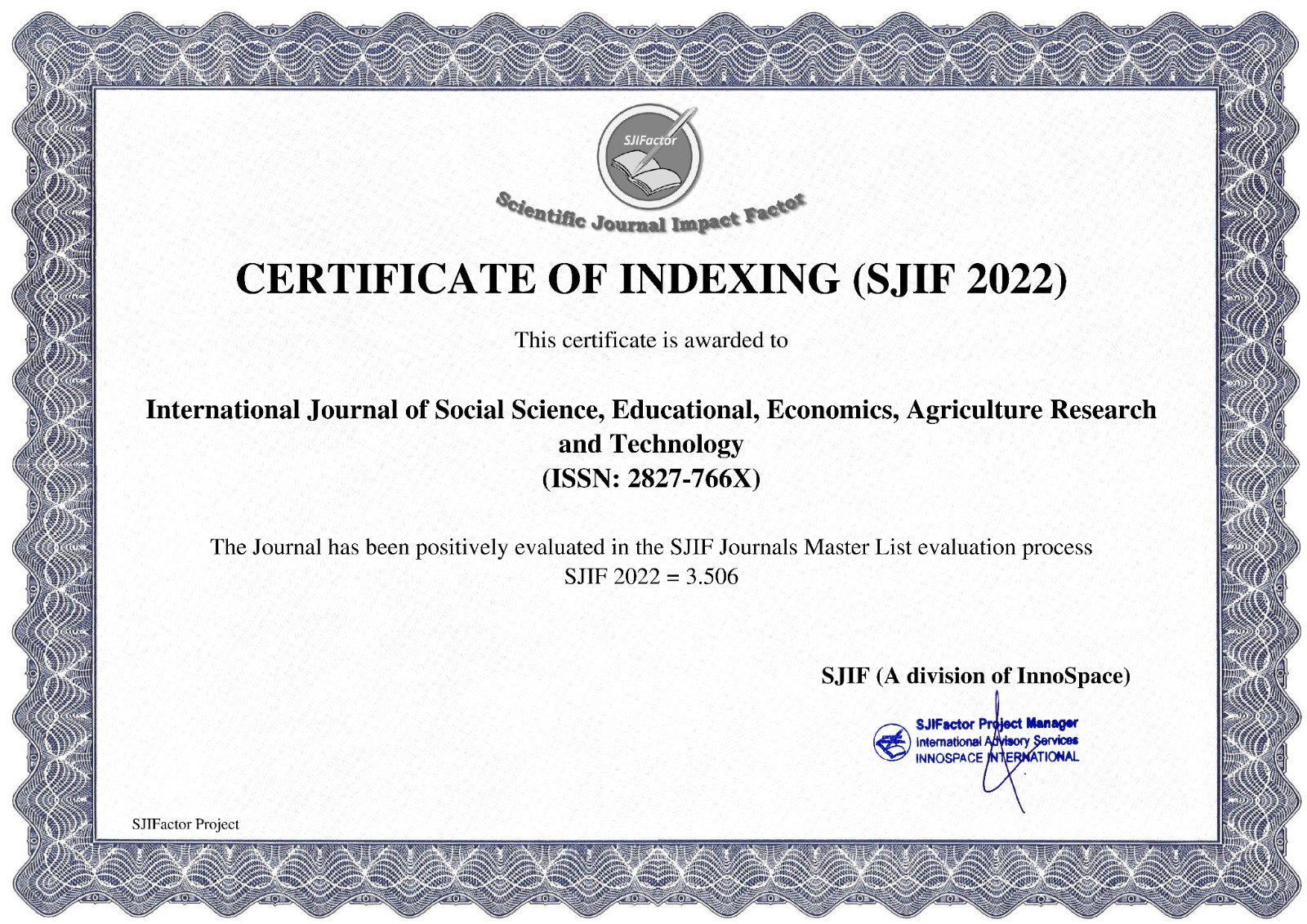THE EFFECT OF SELF EFFICACY AND MOTIVATION ON ENTREPRENEURSHIP INTERESTS IN BUSINESS ADMINISTRATION STUDENTS
Main Article Content
Yusnidar
Cut Sukmawati
Nursakinah Ritonga
Nanda Ameliany
Lisa Iryani
Economic problems are the main concern of the government in developing countries, for example, such as Indonesia unemployment and poverty. One solution to dealing with unemployment is to become an entrepreneur and create jobs for oneself and others, namely by entrepreneurship. And this can be realized if equipped with supporting knowledge, namely entrepreneurship. This research aims to determine the influence of self-efficacy and motivation variables on interest in entrepreneurship in Business Administration students at FISIPOL UNIMAL. This research used 100 samples with a sampling technique, namely non-probability sampling. The data were analyzed using multiple linear analysis with the help of the IBM SPSS 25.0 program. The results of the research show that partially the self-efficacy variable is positive and significant on interest in entrepreneurship among FISIPOL UNIMAL Business Administration students. This can be seen from the significant value of the self-efficacy variable, namely sig. is 0.000 < 0.05 and the tcount value is 6.056 > ttable 1.985, then H1 is accepted. For the motivation variable, it was concluded that it partially had a positive and significant effect on interest in entrepreneurship among FISIPOL UNIMAL Business Administration students. This can be seen from the significant value of the motivation variable, namely sig. is 0.000 > 0.05 and the t value is 5.001 > t table 1.985, then H2 is accepted. Meanwhile, simultaneously the variables self-efficacy and motivation together have a positive and significant effect on interest in entrepreneurship among FISIPOL UNIMAL Business Administration students.
Andini, D. P., & Engriani, Y. (2019). Pengaruh Self-Efficacy, Tolerance for Risk, dan Kebebasan dalam Bekerja terhadap Minat Entrepreneurship Mahasiswa Universitas Negeri Padang. Jurnal Kajian Manajemen Dan Wirausaha, 1(4), 34–47. https://doi.org/10.24036/jkmw0278980
Astiti, R. D. (2023). Pengaruh Self-Efficacy, Tolerance For Risk, an Environment Terhadap Minat Enterpremeurship Santri (Studi Anggota Hebitren Pondok Pesantren Muhammad Al-Fatih dan Al-Izzah Surakarta).
Eliyana, A., Musta’In, Sridadi, A. R., & Aviantari, N. (2020). Linking self efficacy on motivation and entrepreneurial achievements. Systematic Reviews in Pharmacy. 11(8), 328–334. https://doi.org/https://doi.org/10.31838/srp.2020.8.50
Firmansyah, M. A., & Roosmawarni, A. (2019). Kewirausahaan (Dasar dan Konsep). Buku, September, 1–207.
Ghozali, I. (2018). Aplikasi Analisis Multivariate Dengan Program IBM SPSS 25. Badan Penerbit Universitas Diponegoro.
Ghozali, I. (2021). Aplikasi Analisis Multivariate Dengan Program IBM SPSS 26 Edisi 10. Badan Penerbit Universitas Diponegoro.
Hananizzah, N. R. (2022). Pengaruh Motivasi Kerja Dan Kepuasan Kerja Terhadap Kinerja Karyawan Pada Perusahaan Daerah Air Minum (PDAM) Kota Malang. Universitas Islam Negeri (UIN) Maulana Malik Ibrahim Malang.
Hestanto. (2023). Teori Minat Berwirausaha. https://www.hestanto.web.id/teori-minat-berwirausaha/
Kurniati, E. D. (2015). Kewirausahaan Industri. Depublish.
Mc Clelland, D. C. (1988). Human Motivation. Cambridge University Press. Muchtar, Y., Azis, M., & Rakib, M. (2019). Pengaruh Lingkungan Tempat Tinggal, Intensitas Pendidikan Ekonomi Keluarga, dan Pembelajaran Kewirausahaan Terhadap Minat Berwirausaha Mahasiswa (Studi di Fakultas Ekonomi Universitas NegeriMakassar). Journal Economix, 6(2).
Nugroho, S., & Sulistyowati, S. N. (2020). Pengaruh Self Efficacy Terhadap Minat Berwirausaha Mahasiswa Stkip Pgri Jombang. Jurnal Pendidikan Ekonomi, 14, 275–280. https://doi.org/10.19184/jpe.v14i2.19526
Pratiwi, F. Y. dan I. (2023). BPS: Indonesia Punya 7,99 Juta Pengangguran. https://ekonomi.republika.co.id/berita/ru66wh370/bps-indonesia-punya-799-juta- pengangguran
Purnamarini, T. R., & Maulida, A. (2023). Pengaruh Motivasi dan Self Efficacy Terhadap Minat Berwirausaha Mahasiswa Prodi Manajemen Universitas Sarjanawiyata Tamanasiswa. Jurnal Riset Manajemen, 10(1), 66–75. https://doi.org/10.32477/jrm.v10i1.512
Resanti, Niken. (2022). Pengaruh Self Efficacy, Tolerance For Risk, dan Kebebasan Dalam Bekerja Terhadap Minat Entrepreneurship (Studi Kasus Pada Mahasiswa Manajemen Fakultas Ekonomi dan Bisnis Universitas Islam Malang). Jurnal Ilmiah Riset Manajemen. 11(02). 89-102
Ritonga, N. (2019). Pengaruh Perceived Ease of Use, Discount, dan PerceivedUsefulness Terhadap Niat Penggunaan Aplikasi Grab dan Dampaknya Terhadap Keputusan Pembelian Jasa Grab. Universitas Brawijaya.
Santoso, S., & Oetomo, B. S. (2018). Influence Of Motivation and Self Eficacy on Entrepreneurial Intention To Run a Business. Expert Journal of Marketing, 14–21.
Saragih, M. H., & Kurniawan, S. (2022). The Influence of Self-Efficacy and Motivation on Entrepreneurial Intentions Among Millennial Business Students. Jurnal Simki Economic, 5(1), 7–19. https://jiped.org/index.php/JSE
Suari, G. A. M. S. (2019). Pengaruh Keberhasilan Diri, Keberanian Mengambil Risiko dan Kebebasan dalam Bekerja Terhadap Minat Berwirausaha Mahasiswa Prodi Manajemen Fakultas Ekonomi dan Pariwisata. Doctoral dissertation.
Sugiyono.(2018).Metode Penelitian Kuantitatif. Alfabeta.
Suritno, A. W. C. (2022). Pengaruh Kebebasan Dalam Bekerja, Keberhasilan Diri Dan Toleransi Akan Resiko Terhadap Minat Mahasiswa Menjadi Wirausaha DiSurabaya Barat. Pragmatis, 1(2), 81–90.
Suyati, E. S., & Rozikin, A. Z. (2021). The Influence of Motivation and Self-Efficacy Towards The Students’ Entrepreneurship Interest in Muhammadiyah University of Palangkaraya. Jurnal Economia, 17 (1), 91–100. https://doi.org/https://doi.org/10.21831/economia.v17i1.33123
Tartyla, L. (2023). Pengaruh Self-Efficacy, Toleransi For Risk, Dan Kebebasan Dalam Bekerja Terhadap Minat Entrepreneurship Mahasiswa Manajemen Bisnis Syariah.
Yulianti, S., & Gampito. (2022). Pengaruh Motivasi dan Self Efficacy Terhadap Minat Berwirausaha Pada Siswa Jurusan Pemasaran SMK Negeri 1 Payakumbuh. Jurnal Tamwil: Jurnal Ekonomi Islam, VII(02), 118–126.
https://digilib.uin-suka.ac.id,diakses pada tanggal 17 September 2023
https://pddikti.kemendikbud.go.id, diakses pada tanggal 12 Mei 2024
https://katadata.co.id, diakses pada tanggal 20 Januari 2024
https://glints.com, diakses pada tanggal 12 Mei 2024
https://akupintar.id, diakses pada tanggal 12 Mei 2024
https://www.admbisnis.fisip.unimal.ac.id, diakses pada tanggal 01 Januari 2025






















